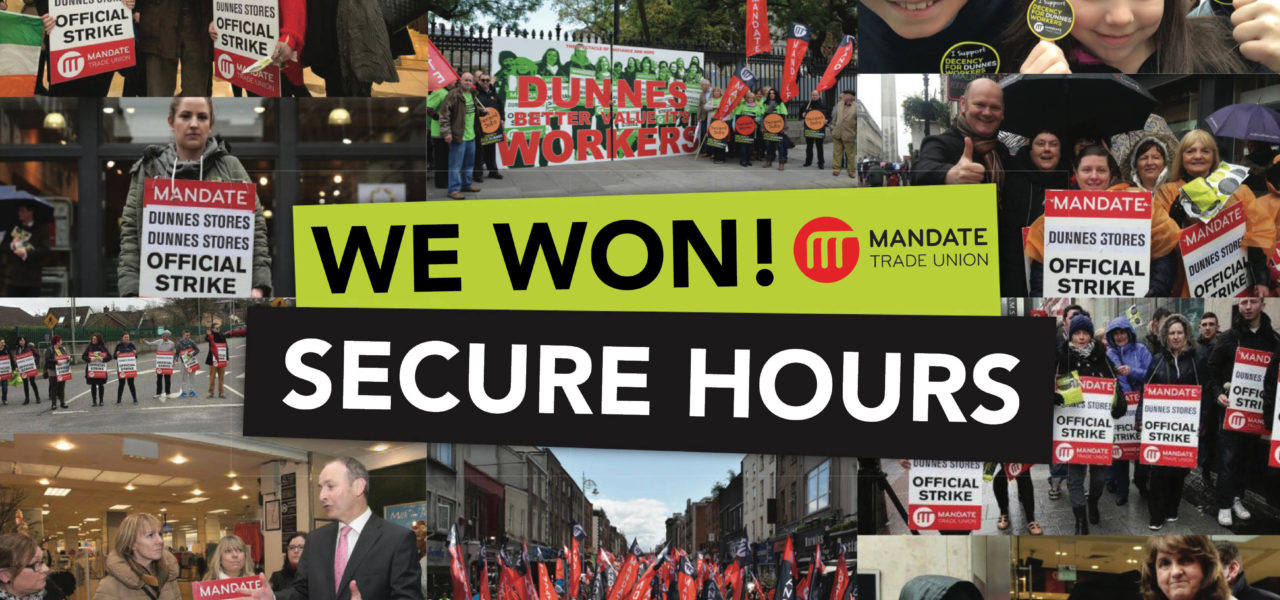
Mandate members win campaign for secure hour contracts
Wednesday 19 December 2018Mandate Trade Union has welcomed the passing of the Employment (Miscellaneous Provisions) Bill 2017 in the Dail, and has congratulated the Dunnes Stores workers on being the catalyst for this important piece of legislation.
The Bill, which will be enacted within the next three months, will enable workers to seek a new contract of employment after 12 months which reflects the hours of work they do.
Dunnes Stores workers went on strike in April 2015 in order to raise awareness of the issue of low hour contracts with some workers being dismissed and others having their hours slashed as part of a campaign of retribution by management.
Mandate said the Dunnes Stores workers and Mandate activists who lobbied for the last four years can take the majority of the credit for this Bill’s passing.
John Douglas, Mandate General Secretary said: “Our members in Dunnes took the brave decision to go on strike for secure hour contracts four years ago. They brought the issue of insecure work to national attention, and they paid a price for doing so. It has taken four years for politicians to catch up, but now that they have passed this crucial Bill, vulnerable workers will have the opportunity to obtain a contract of employment which reflects the hours they actually do.”
Mr Douglas continued by explaining how the new legislation will improve the lives of tens of thousands of workers:
“Now, as a result of this legislation, thousands of workers will be able to apply to their employer after 12 months seeking a new contract with secure hours. This removes the uncertainty about whether you will be able to pay your bills this month, and will enable workers to better plan their lives.”
He continued: “In Dunnes Stores, for instance, workers are on 15 hour contracts. You might be working 40 hours per week for 10 years, but because your contract says 15, your employer can slash your hours at any time. So if you join a trade union, go on strike, or even raise a grievance, your local manager can cut your hours to 15 and spread those hours over four days so you do not have access to supplementary social welfare.
“The impact of this behaviour by managers is significant for low paid workers. It can mean a cut in wages from €400 per week to €150 the next week. How can anyone manage a household budget with that level of precarity hanging over their heads. And with 85 percent of Dunnes workers saying that allocation of hours is used as a method of control over them, you know this is a very serious issue.”
Mr Douglas concluded by explaining how the new Bill will impact on the housing crisis:
“Having ultra-flexible contracts with no certainty of hours or income denies many workers the opportunity of obtaining a mortgage. When a worker goes into a bank, they can only obtain a mortgage based on the guaranteed hours in their contract. That means an average Dunnes worker would only be able to obtain a mortgage for approximately €30,000, which is impossible to purchase a house in Ireland and means the worker is stuck in the private rental sector where rents have increased by more than 80 percent in recent years.”
Mandate Trade Union will be organising local and regional meetings early in the New Year to assist workers in applying and enforcing the provisions contained in the new legislation.
History of the Bill
The original Bill addressing this issue emanated from Sinn Fein, who drafted it in December 2014 based on the Penneys contract of employment which was negotiated by Mandate Trade Union. The Bill was eventually entitled the Banded Hour Contract Bill and was moved by David Cullinane TD after the 2016 General Election.
Following the Dunnes Stores strike in April 2015, Minister of State Ged Nash commissioned research into the prevelence of zero hour contracts which was conducted by the University of Limerick. Mandate’s interactions with the research team ensured the report was a broader inspection of precarious contracts of emplyment including “If and When” contracts.
The Banded Hours Contracts Bill 2016 progressed through the Dail, and then through the Committee Stage, only to be delayed by the government who wanted to pass their own Bill on the issue.
The government moved their Bill in December 2017, which was much weaker than the original Bill – including an 18 month look-back reference period and bands of hours that still enabled employers to slash hours by up to 50 percent. Mandate members lobbied TD’s and Senators seeking to improve the Bill and won key amendments.
Thanks
Mandate Trade Union want to thank Sinn Fein’s David Cullinane TD and his colleague Conor McCabe who pushed the issue relentlessly over the last three years. Thanks also goes to Joan Collins TD, Clare Daly TD and Rhona McCord who attempted to strengthen the Bill at committee stage by enabling workers to avail of more hours at work when available. Senator Lynn Ruane also pushed similar amendments. Senator Ged Nash from the Labour Party has supported the Bill and introduced his own Bill in 2016, and also commissioned research into the issue in 2015 when he was Minister of State. Solidarity/People Before Profit also gave support to the Bill through the different stages, as did Fianna Fail. Thanks is due to Minister Regina Doherty and all other political parties and Independent representatives who brought the Bill to completion.
However, the Dunnes Stores workers should take a large proportion of credit, along with Mandate Trade Union members who joined lobbying teams all across the country putting all TD’s under pressure to pass this Bill with six keys demands as identified through the Secure Hours = Better Future campaign.
Watch
Video 1 – the first strike for secure hours
Video 2 – public demonstration in support of the Dunnes workers





